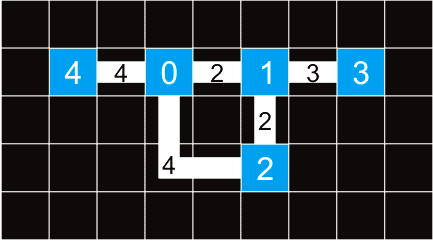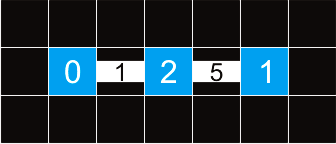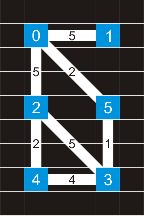There is a kingdom with N cities numbered 0 through
N-1. Gogo wants to survey several cities in the kingdom. These cities are described in int[]
cities containing M elements. He wishes to survey city cities[0], city
cities[1], ..., city cities[M-1] in this exact order (i.e., before surveying city
cities[i], he must have finished surveying cities cities[0], ...,
cities[i-1] in this order). He starts at city 0 and can end at any city. He may only survey a city when he's inside the city. There are several bidirectional roads, each connecting two different cities and costing some amount of money to traverse.
Note that he may wish to survey the same city multiple times.
Gogo also has a time machine. He can use the time machine to go back in time, without affecting which cities he is considered to have already surveyed. For example, suppose he has visited cities A, B, C, D, and E, in that order, and is currently in city E.
He can use the time machine to go back to city A, B, C, or D. Suppose he chooses to go back to city C. At that point, he can then go back further to city A or B, but he cannot use the time machine to go forward to city D or E. Note that if he had surveyed
city E, going back in time will not change the fact that he is considered to have already surveyed city E.
You are given the roads in the String[] roads. Concatenate the elements of
roads, in order, to get a single space-separated list of roads. Each road will be formatted "a,b,travelcost" (quotes for clarity), which means that the bidirectional road connects city a and city b, and costs travelcost to traverse.
He can use the time machine any number of times, and it costs nothing to use it. Return the minimum cost required to survey all cities from
cities in the given order. Return -1 if it is impossible to survey them all. |
|
Definition
|
|
| Class: |
TimeTravellingTour |
| Method: |
determineCost |
| Parameters: |
int, int[], String[] |
| Returns: |
long |
| Method signature: |
long determineCost(int N, int[] cities, String[] roads) |
| (be sure your method is public) |
|
|
|
|
Notes
|
| - |
Surveying a city does not incur any cost. |
|
Constraints
|
| - |
N will be between 2 and 50, inclusive. |
| - |
cities will contain between 1 and 50 elements, inclusive. |
| - |
Each element of cities will be between 0 and
N-1, inclusive. |
| - |
No two consecutive elements in cities will be identical. |
| - |
cities[0] will not be 0. |
| - |
roads will contain between 1 and 50 elements, inclusive. |
| - |
Each element of roads will contain between 1 and 50 characters, inclusive. |
| - |
Each character in roads will be '0'-'9', ' ', or ','. |
| - |
roads will be formatted as described in the problem statement without leading or trailing spaces. |
| - |
All integers in the concatenation of all the elements of
roads in the order they are given will have no leading zeroes. |
| - |
In each road, a and b as described in the problem statement will be different and will each be between 0 and
N-1, inclusive. |
| - |
In each road, travelcost as described in the problem statement will be between 1 and 10,000,000, inclusive. |
| - |
For each two different cities, there will be at most one road connecting them. |
|
Examples
|
| 0) |
|
|
5
|
{2,3,2,4}
|
{"0,2,4 0,1,2 2,1,2 1,3,3 4,0,4"}
|
|
Returns: 13
|

Travel from city 0 to city 1 to city 2. Survey city 2. Go back in time to city 1. Travel from city 1 to city 3. Survey city 3. Go back in time to city 1. Travel from city 1 to city 2. Survey city 2. Go back in time to city 0. Travel from city 0 to city 4. Survey
city 4. The total cost is 2+2+3+2+4=13. |
|
|
| 1) |
|
|
3
|
{1,0,1}
|
{"0,2,1"," 2",",1,5"}
|
|
Returns: 12
|

Travel from city 0 to city 2 to city 1. Survey city 1. Go back in time to city 0. Survey city 0. Travel from city 0 to city 2 to city 1. Survey city 1. |
|
|
| 2) |
|
|
|
|
Returns: -1
|

It is not possible to reach city 2. |
|
|
| 3) |
|
|
6
|
{4, 1, 3, 2}
|
{"0,1,5 0,2,5 0,5,2 2,3,5 2,4,2 3,4,4 3,5,1"}
|
|
Returns: 19
|

Travel from city 0 to city 2 to city 4. Survey city 4. Travel from city 4 to city 3 to city 5 to city 0 to city 1. Survey city 1. Go back in time to city 3. Survey city 3. Go back in time to city 2. Survey city 2. The total cost is 5+2+4+1+2+5=19 |
|
|
【题解】
此题很难,自己一时说不清楚。
官方题解:
So, first, we are at city 0, we need to survey cities[0]..cities[M-1]. Can we actually represent this as our state? I.e, a triple (C,u,v) which means that we're at city C and need to survey cities[u]..cities[v]? Let's investigate!
So what happens now is that we move to another city, suppose city D. So now, we're at city D, we need to survey cities[0]..cities[M-1]. If cities[0] is city D, then we survey the city and update into cities[1]..cities[M-1]. However, if we represent this
as triple (D,u,v), we lose the fact that we can travel back in time to city C. So it appears that we can't forget about city C. But there lies the key to the problem.
Suppose we travel back in time to city C. Can we now forget about city D? We can, since we can't reverse back to city D and so aside from its effect on u and v, it leaves no other trace.
Let's revisit the triple (D,u,v). If we will never reverse back in time to city C, then this triple will be sufficient. Otherwise, we will at some time reverse back to city C. The question is when? We will need to travel back in time to city C because we
want to survey some city cities[i] in cities[u]..cities[v]. So the idea is that we will at some point reverse the time back to city C to survey some cities[i]..[v] (to v because once we go back in time, we effectively forget about D and all cities we traversed
afterwards). This also implies that during our trip to survey cities[u]..cities[i-1], we will never return back in time to city C (Except if we revisit city C through 'traversing' and not 'going back in time' - but in this case we will ultimately be able to
travel back in time to city C that we first visit). Hey, now we seem to have a solid ground to step on!
Indeed, during our trip to visit cities[u]..cities[i-1], the fact that we will never return back in time to city C enables us to forget city C during that course, i.e., it can be conveniently represented by the tuple (D,u,i-1). And then, since we will never
travel back in time when we're already at city C, we can also represent the other part as a tuple (C,i,v) (since we won't need to remember D).
So what's the conclusion of our discussion so far? We can represent our state as a triple (C,u,v), and we can solve a triple by breaking it into two other triples. Now, we if we treat each triple like how we treat the triple above, then we get a recursive
solution!
Solution the First
So, how do we solve a triple (C,u,v)? In other word, what should a triple return? Well, let's define the triple again.
(C,u,v) is the minimum cost required such that we're now at city C, we're not allowed to go back in timefurther than this city, and we need to survey cities[u]..cities[v].
And now, the recursion will be presented in a pseudocode
if (u > v) {
return 0;
}
if (cities[u] == C) {
return (C, u+1, v);
}
answer = huge number;
for each city D {
for i = u to v {
answer = min(answer, (D, u, i-1) + (C, i, v) + dist[C][D])
}
}
return answer;
分享到:












相关推荐
topcoder的数学类算法题目。一个整数被称为k-smooth当且仅当它的最大素因子不大于k,给定N和K,计算出1 - N中有多少个整数是k-smooth。1 , 1 <= K <= 1000.
omron系列CPM1/CPM1A/CPM2A/CPM2C/SRM1(-V2) PLC编程手册pdf,omron系列CPM1/CPM1A/CPM2A/CPM2C/SRM1(-V2) PLC编程手册
SRM2Multi dumper for hsap
SAP SRM 介绍
VMware SRM 系统管理员手册 技术手册 云计算 虚拟化必备
Driver HASP SRM emulator (x86)
简叙什么是SRM,SRM解决什么问题,SRM有用途,SRM功能等
srm后端JAVA 供应商平台管理 标准物资开票表 bus_standard_invoice_out增加freeze_quantity(冻结数量这一列)。 标准物资开票表 bus_standard_invoice_out的主键为{行项目、采购订单号、物料凭证}。 标准物资...
云计算 虚拟化 VMware SRM 安全相关 技术文档 参考手册 官方文档
多年SRM实施经验总结,对希望从事SRM实施或规划的同学们有帮助
Workflow Guide SAP SRM 2007
分块描述SRM系统的作用:寻源、协同和考核 涉及具体的业务用途,供前期规划作参考,可根据实际情况调整,再考虑如何实现
ASP SRM USB Command Line Dumper Instructions. HASP SRM USB命令行转储指令。 WARNING!!! Before make dump from dongle make sure that you install the ...2. 2. Execute h7dmp.exe file. 执行h7dmp.exe文件。
SRM COOKBOOK 文档 SAP SRM Advanced EBP Cookbook(1).pdf
欧姆龙CQM1/CPM1/CPM1A/SRM1 PLC操作手册pdf,欧姆龙CQM1/CPM1/CPM1A/SRM1 PLC操作手册
SRM210 (PA)SAP SRM Server Configuration (Col92) Configuration
HASP_SRM_Runtime_setup
SRM Overview中文版让你更直观更容易了解SRM是什么,能做什么
SRM影像分割算法的matlab程序,主函数SRM_new
SRM空间富模型隐写分析算法,选区高维特征,使用集成分类器进行训练